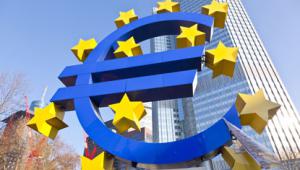Additional figures also released today by the EU’s statistical body Eurostat showed inflation surge to 1.8% and unemployment fall to 9.6%.
The preliminary figures showed that seasonally adjusted GDP in the eurozone grew by 0.5% in the fourth quarter of 2016, compared with the previous quarter. This represents a marginal increase in the rate of growth, which was 0.4% in the third quarter of 2016.
Over the year as a whole, the eurozone economy grew by 1.7%,
Across the entire EU, growth was 0.6% in the final quarter of last year, up from 0.5% from the previous quarter. Growth across the EU for the year was 1.9%.
Annual inflation for the eurozone is expected to be 1.8% for January, up from 1.1% in December last year, according to the flash estimate from Eurostat. Inflation is measured by the Consumer Price Index.
The sharper rise was mostly driven by the energy sector (which inflated by 8.1% in January compared with 2.6% in December), and food and tobacco prices.
Across the eurozone, the average unemployment rate was 9.6% for December 2016, a slight decrease from 10.5% in November. This represents the lowest rate recorded in the eurozone since May 2009.
For the wider EU, unemployment was unchanged at 8.2% for the same period – the lowest rate since February 2009.
However, these record-low rates mask significant regional disparities in unemployment rates across the continent, between the Czech Republic (3.5%) and Germany (3.9%) on one hand, and Greece (23%) on the other. Also, youth unemployment remains strikingly high in Italy (40.1%) and Spain (42.9%).
Oliver Kolodseike, senior economist at CEBR, noted that eurozone inflation was now approaching the target set by the European Central Bank of just below 2%. He said this, combined with steady growth figures, was likely to increase pressure on the bank to return to normalised monetary policy for the region.
However, he added: “The bank may be keen to avoid a premature tapering of the stimulus programme during a time when uncertainty from Brexit, the new US government and elections in France and Germany is on the horizon.”













